COMMUNITY CORNER
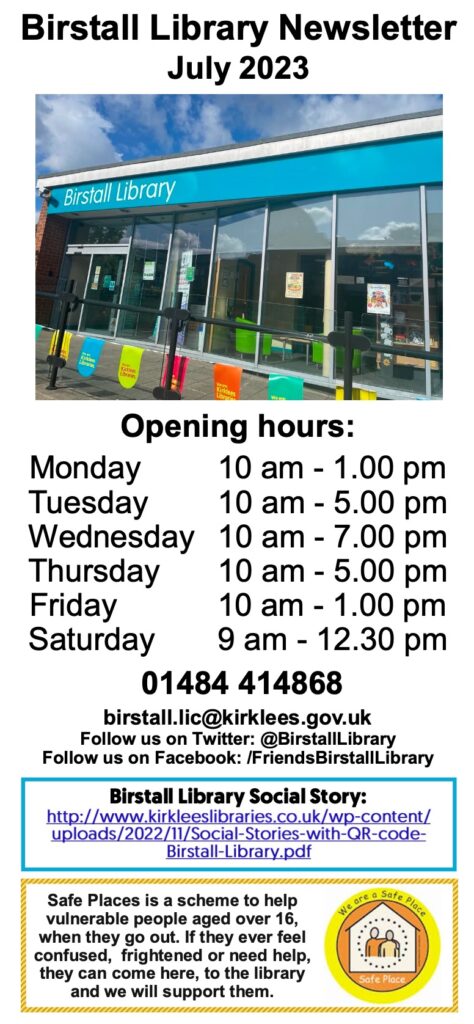
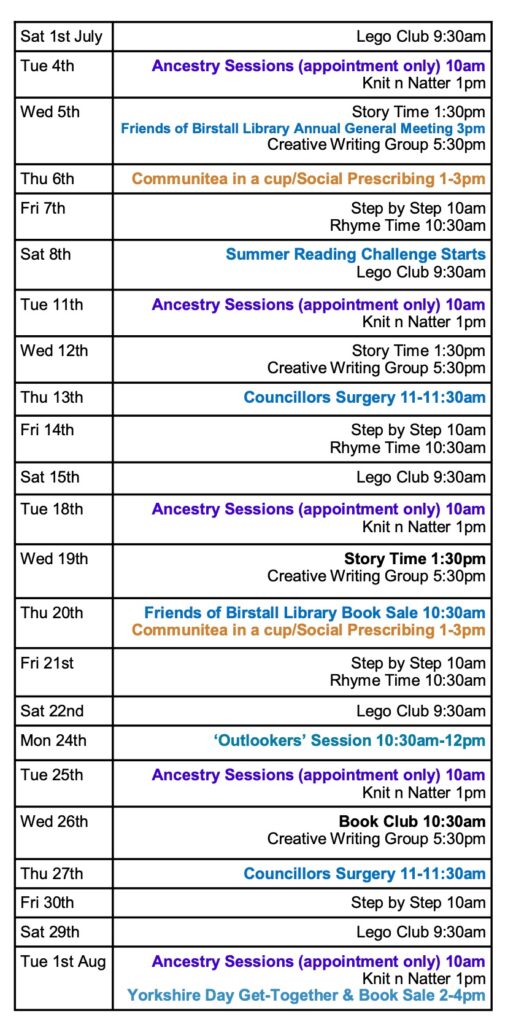
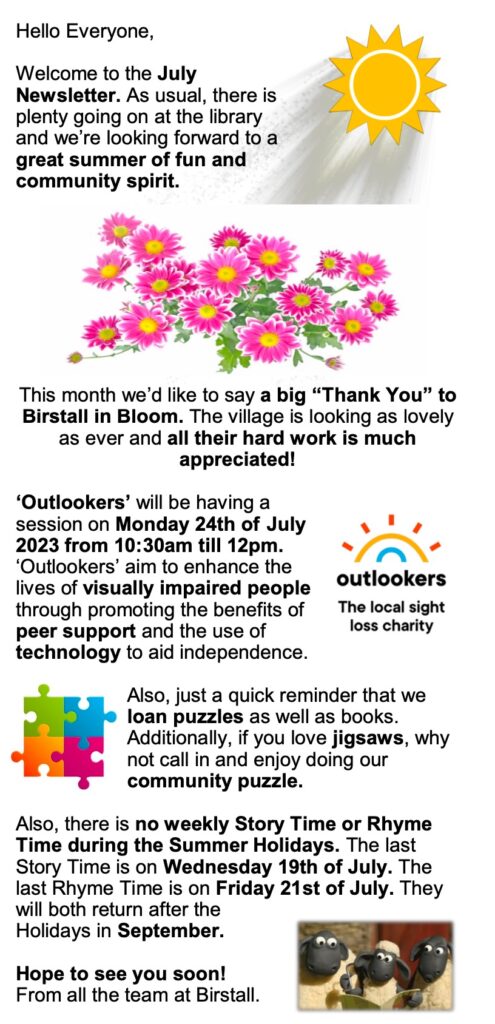

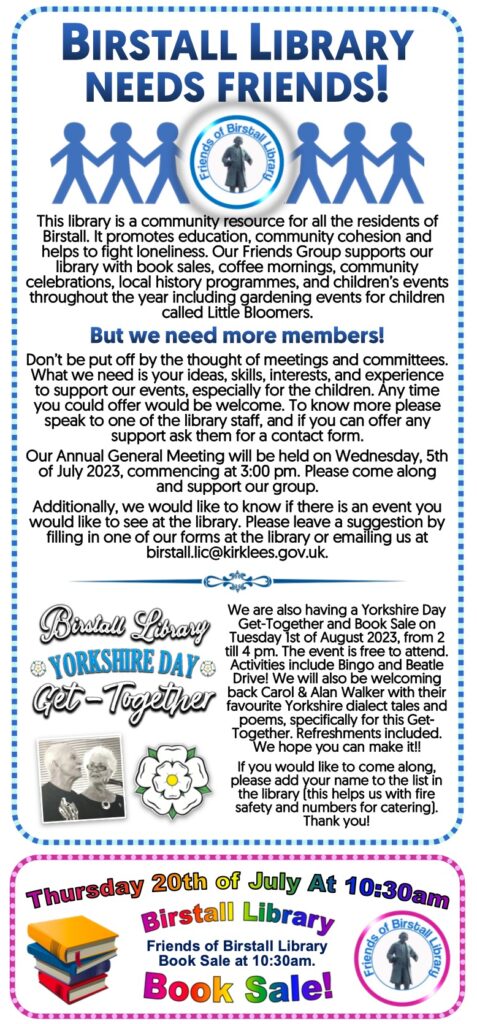
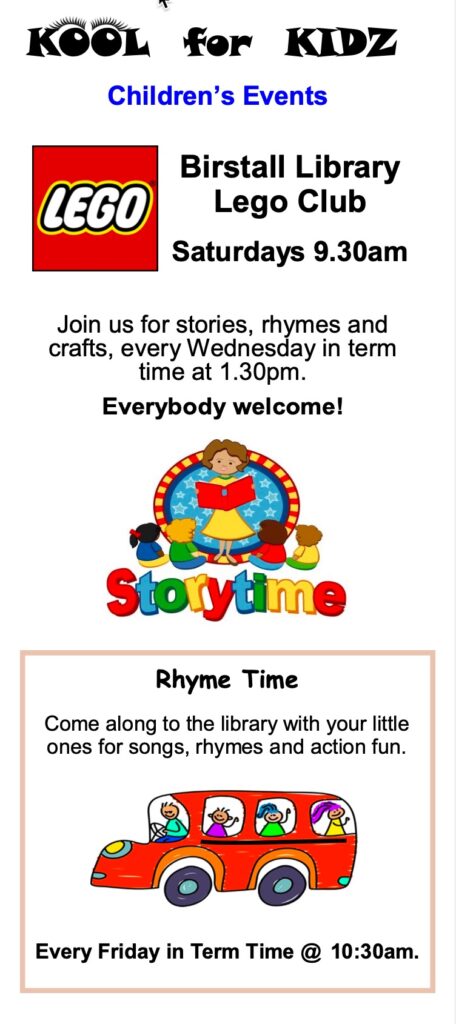
Friends of Birstall Library
The Friends of the Birstall Library is a non-profit, charitable group of volunteers formed to support the library in our community. Support from the Friends groups may be financial, political and cultural.
Our goal is to help the Birstall Library and Information Centre remain a Social and Educational Hub for the village. We work to help create a library service that works for the whole community, including:
- host coffee mornings as a social activity and to fundraise
- raise money for extra library equipment or activities such as writing workshops
- promote their local library on social media
- arrange talks with authors
In addition, we work collaboratively with the community to ensure that the library is sustainable and relevant for the future. We also evaluate the various ways that the library may develop in the future and how to ensure that it continues to reflect the priorities of our local community. This strategy takes into account what we know about:
- The way the city is changing
- Needs and ideas identified in consultations and engagement with the community staff, and service users
- Measures about our current service provision and use
- Costs to deliver library services
Birstall Chamber Of Trade
Welcome to the Birstall Chamber of Trade page. We are a group of businesses in Birstall, whose aim is quite simply, to keep Birstall thriving.
There is a wide variety of businesses in Birstall, not just in the town centre, but in the surrounding area, who are all members of the Birstall Chamber of Trade. We work closely together to promote our businesses, encourage, advise and support each other, as well as hosting events for the community.
As members we feel that it’s important to work with and support the local community and other community groups such as, Birstall in Bloom, Friends of Birstall Library, The Rotary Club of Birstall Luddites, Oakwell Hall, Birstall Youth Project and the local community Police, to name but a few.
Birstall Community Trust
The mission of the Birstall Community Trust is to acquire and run Birstall Community Centre in an effort to provide facilities in the interest of social welfare for recreation and leisure time occupation, ensuring that the building is maintained on behalf of the residents of Birstall and to use any surpluses for the benefit of the Birstall community.
Birstall in Bloom
We consist of a small voluntary group who are tasked with making Birstall look beautiful.
Birstall In Bloom develops and maintains gardens, tubs and planters around Birstall village centre. Our objective is to make Birstall more attractive for residents and visitors. Over the years we have created “Welcome to Birstall” stones, gardens and a memorial garden.
We hold fundraising events to allow us to supply plants and other landscape features for the village. Our members work in the village weekly, planting, weeding and maintaining the whole of the village centre.
We have created a garden of remembrance to commemorate the 100 years since the start of WW1 and taken control of a number of ‘grot spots’ turning them into beautiful borders for the whole community to enjoy.
Birstall In Bloom is a joint venture between The Birstall Luddites (Rotary), Birstall Village Improvement Group and local TRAs working with local schools and churches, our local councillors and Kirklees Metropolitan Council.
The aim is to enter Britain in Bloom and, by doing this, improve more and more of Birstall each year for the benefit of local people.
The Britain in Bloom competition was first held in 1964 and has been organised by the Royal Horticultural Society (RHS) since 2002. The RHS run the Britain in Bloom campaign with more than 1,100 communities the length and breadth of the UK working to improve their local environments. It is not just about planting flowers and hanging baskets. Its about developing community spirit and civic pride whilst promoting responsibility for planting, cleanliness and maintenance. This in turn boosts the local economy through increased tourism, stimulates voluntary work and cooperation between community groups.
A strong community spirit makes Birstall an interesting and lively place to live. Many local societies exist including Birstall in Bloom, which sees many local people coming together on a regular basis to develop and maintain gardens and floral decorations around the village. Birstall has entered Yorkshire in Bloom since 2011 with great success.
The Friends of Oakwell Hall
Oakwell Hall was built by John Batt in 1583 and is now run as a ‘living museum’ furnished as the Batt family home in the 1690s.
The Friends of Oakwell Hall and Country Park, founded in 1988, are a voluntary support group for this wonderfully authentic 16th Century Manor House in Yorkshire – and for its surrounding 110 acres of country park.
Whilst many people join the Friends simply because they appreciate the beauty and tranquility of the Hall and Park, others join because of the ‘hands on’ opportunities available on site. Friends work closely with the dedicated staff at Oakwell and provide assistance both inside and outside the Hall.
We are delighted that Oakwell Hall has been given a number of awards, including fifteen successive green flags and VAQAS (Visitor Attraction Quality Assurance Scheme) accreditation.
It’s not all hard work however as we enjoy a good chat and laugh with each other and the staff when we’re on duty, and everyone is very friendly.
Looking back over the years we’ve faced many challenges and problems, and learnt a lot of new skills, made a lot of friends and thoroughly enjoyed ourselves, so if you still interested come and join us – we can guarantee an interesting time.
Finally remember our unofficial motto; MAKE FRIENDS, BE FRIENDS!
Rotary Club of Birstall Luddites
The Rotary Club of Birstall Luddites, which now includes Batley, was formed in 1988. The inclusion of the name ‘Luddites’ was a tongue in cheek reference to the uprising against modernisation in the textile industry in the early 1800’s.
Today’s ‘Luddites’ in the form of our Rotary Club is a charitable organisation of like-minded people of various backgrounds and cultures, and are thankfully more accepting of progress and help to support individuals, groups, charities, and development in our local community, nationally and internationally. We raise money locally from Christmas Santa Sleigh and Tesco collections, in addition to social and fund raising events through the year. Money raised allows us to make donations locally, nationally and internationally.
New members always welcome
Our Meetings:
· Place: Batley Community Centre, Upper Commercial Street, Batley, WF17 5DH
· Day: Monday evenings (except Bank Holidays)
· Time: 7-7:15PM
See our website or Facebook page for more information about us…
www.birstallluddites.rotary1040.org
https://www.facebook.com/BirstallRotary/
Heartland Community Health & Fitness
Heartland Yoga, Wellness, Fitness is a not-for-profit constitutional group at the Heart of YOUR Community. We deliver sustainable, community-focused FREE chair-based fitness classes in the Kirklees area to improve your physical and mental wellbeing.
Join one of our classes; they’re low impact and gentle on your joints. You can pop along (there’s no need to book) to “sit and get fit” then stay after for our social gathering; a cuppa and a biscuit is a great way to unwind after your yoga inspired chair-based workout.
Birstall Cricket Club
Play-cricket.com – Birstall CC, Yorks
We are a friendly, sociable and inclusive cricket club. New playing & social members always welcome. If you have any queries or would like to join, then please get in touch with us today.
Established in 1885, Birstall Cricket Club has two senior Saturday sides in the Bradford Premier League. The 1stXI play in Division 1 and the 2ndXI in Division 2 of a separate 2nd team competition. Our thriving junior section starts with All Stars Cricket for all children 5 – 7. We also have sides at Under 9,11,13,15 level and a Development Sunday League side made up of junior players with a smattering of senior players to ease our younger players into senior cricket. New players always welcome. Come and see our newly refurbed clubhouse and meet the members.
Birstall Batley Sports and Tennis Centre
The Birstall Batley Sports and Tennis Centre is a local centre with facilities that include main and small swimming pool, indoor and outdoor tennis courts, squash courts, gym, fitness suite, and much more, as well as various activities.
Mon – Fri: 6:30AM – 10PM
Sat – Sun: 8AM – 7PM
Please see our website for full details, timetables and opening times.
https://kal.org.uk/centres/batley-sports-tennis-centre/
Facilities include:
- 25m & 12m Pools
- Gym
- Cycle Studio
- 3G Astro Turf Pitch
- Indoor & Outdoor Tennis Courts
- Squash Courts
- Free Parking
- Accessible Facilities
Visit our centre and see our facilities, we have something for everyone.
Birstall Cadets (Army Cadet Force Batley Detachment)
Yorkshire (North and West) ACF is one of the largest ACF Counties in the UK. Its aim is to inspire young people to achieve success in life, to develop them both physically and mentally. It does this through improving self-confidence, teamwork and leadership skills, and creating great friendships! Yorkshire (North and West) ACF welcomes new members of all abilities and backgrounds to join our wonderful organisation and take part in the great range of activities that we offer
History
The ACF can trace its beginnings to 1859 when there was a threat of invasion by the French. The British Army was still heavily involved abroad after the Indian mutinies, and therefore had very few units in this country. The Volunteers were formed to repel the possible invasion. History was to repeat itself in 1940 during the Second World War when the Home Guard was formed to help counter a threatened invasion by the German Army.
Immediately following the formation of the Volunteers came the start of the Cadets. In 1860 at least eight schools had formed Volunteer companies for their senior boys and masters, and a number of volunteer units had started their own cadet companies. Typical of these were the Queen’s Westminster’s who placed their 35 Cadets at their head when they marched past Queen Victoria at her Hyde Park Review of the Volunteers in 1860.
As in 1940, the 1859 invasion did not materialise. The cadet movement continued, however, because many social workers and teachers saw in it great value as an organisation for the benefit of boys, particularly bearing in mind the appalling conditions in which so many of them lived. Among these pioneer workers was Miss Octavia Hill who had done a great deal to establish the National Trust. She was certainly not a militarist. She formed the Southwark Cadet Company in order to introduce the boys of the slums of that area to the virtues of order, cleanliness, teamwork and self-reliance. The present conception of the Army Cadet Force as a voluntary youth organisation, helped and inspired by the Army, really stems from that time and has continued throughout the ACF’s history.
After the conversion of the volunteers to the Territorial Army (TA) by Lord Haldane in 1908, public schools and Universities were asked to produce units of the Officers Training Corps, and other Cadets Corps were formed into school units and open units for boys who had left school. The title “Cadet Force” was introduced and the administration of the Force was taken over by the newly formed Territorial Associations.
In the First World War a big expansion of the Cadet Force took place and the War office reassumed responsibility for its administration up until 1923 when the Territorial Associations again took over. In 1930 the Government ceased to recognise the Cadet Force and withdrew financial support from it. Everything had to be provided by private raised money and even wearing of Regimental badges and buttons were forbidden. A body known as the British National Cadet Association (BNCA) was formed with the aim of getting official recognition restored. They achieve this aim at least to a limited degree in 1932 and by 1936 certain services and small grants were provided. The BNCA had the responsibility of running the Cadet Force.
During the Second World War a big expansion of the Cadet Force took place in January 1942. The War Office took over the organisation. Equipment and accommodation were increased grants and free uniforms were authorised. The BNCA continued to deal with such matters as sport, competition shooting, and the general welfare of Cadets and many other aspects of cadet work. The BNCA became the Army Cadet Force Association (ACFA) in 1945 and continues to be responsible for those aspects of cadet training and activities, which are not the direct concern of the MOD. In addition, the ACFA are advisers to the MOD and other Government bodies on all matters connected to the ACF.
As a result of the recommendations of a Government committee in 1957, the Cadet Training Centre at Frimley Park, Surrey was opened in 1959. This centre provides courses for officers and adult instructors of the ACF and the CCF and also leadership courses in the summer for a limited number of senior Cadets.
The centenary of the ACF was celebrated in 1960. The chief event was the presentation of the banner to the force by HRH the Duke of Edinburgh at a ceremony at the Tower of London. During the year, this Banner was passed from unit to unit and county to county throughout the whole of the United Kingdom. It was trooped in many places before various distinguished people were laid on the altar of numerous parish churches and cathedrals at special Centenary Year Services. The Banner is now housed at the Cadet Training Centre, Frimley Park. Another highlight of the Centenary Year was the review of large representative parade of the ACF and CCF by HM the Queen and HRH the Duke of Edinburgh in the grounds of Buckingham Palace. This was followed by an impressive thanksgiving service in Westminster Abbey.
Recent changes in the ACF have resulted in the provision of a more modern and workmanlike uniform and the introduction of the Army Proficiency Certificate (ACF) which replaced Certificate A. Certificate A had been in use in the Cadet Forces in various forms since 1910.
There are about 40,000 Cadets in some 1,600 detachments, which are to be found in every part of the United Kingdom. The ACF continues to play its part as the Army’s own voluntary youth organisation and is a valuable recruiting source for the Regular Army.
Cadet and the community
The Army Cadets plays an active role in the local community. A major part of the training for any cadet is citizenship training and the topic forms part of the Army Cadets syllabus. Through participating in community projects you will build an understanding of how a community functions and the difference you can make now or in the future.
At the very basic level it may involve your attendance at the annual Festival of Remembrance Parade in your town or village.